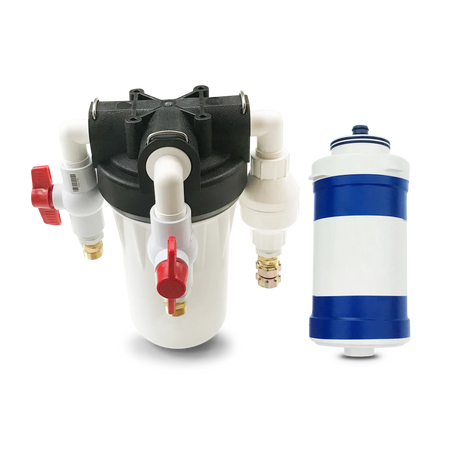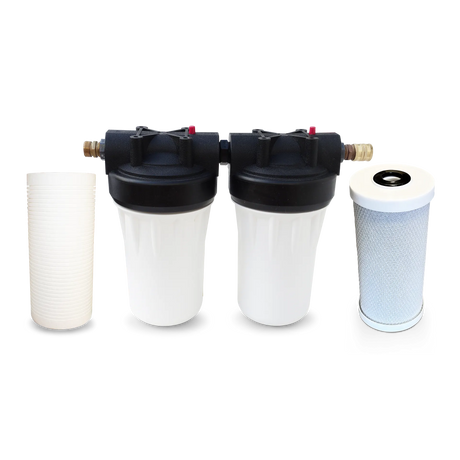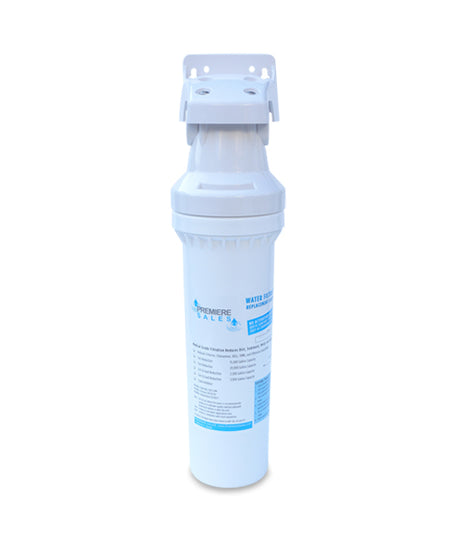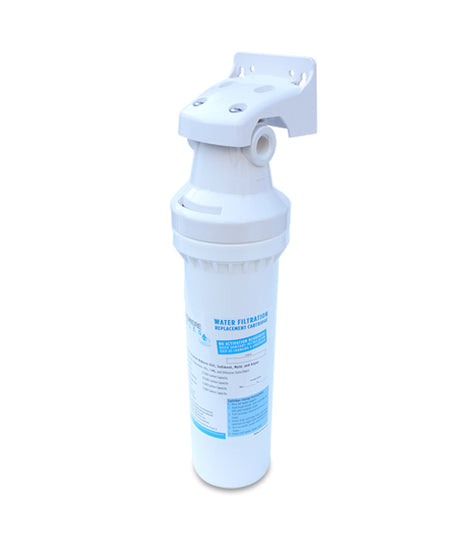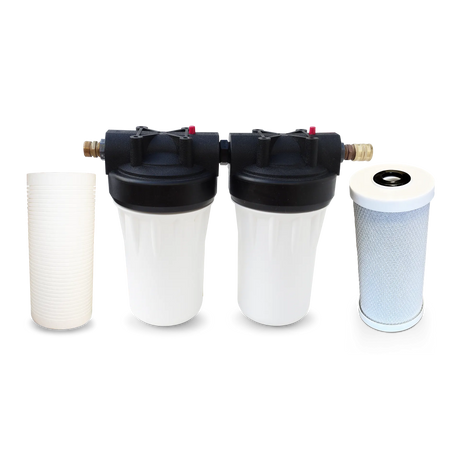Best RV Water Filter Systems 2024 - How to Choose an RV Water Filter System for Your Water Conditions
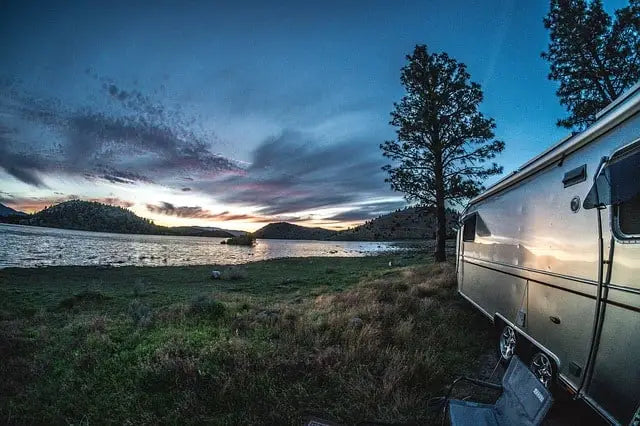
Having fresh, clean water to drink and use is important. Whether you are traveling around in your RV or it's in a long-term location, the quality of the water supply will vary over time and especially from location to location. What is in the water and how much of that "what" is simply unknown. The available water might be unsafe for drinking or using without treatment. Having an adequate RV water filter ensures you'll be able to drink and use the water, and provides peace of mind you're protected from contaminants. This article aims to help you choose the best RV water filter for your water needs. Water may contain sediment, dirt, rust, and minerals which affect the flavour, look, and smell of the water. Water may also contain dangerous substances, contaminants, and bacteria which can cause serious illness. Additionally, RV water tanks themselves can pose bacterial risks to water safety if the tanks are not adequately cleaned and circulated. For your health, ensure the water you are using and drinking in your RV is safe. The easiest and best way to do that is with an RV water filter. There are various RV water filter systems available in the marketplace, so we want to make it easy for you to find the best RV water filter for your needs. There are several considerations you should take into consideration prior to buying a RV water filter.
Jump to:
- Water quality issues: What's in or could be in the water supply?
- Lead in water
- Sediment in water
- Chlorine in water
- Bacteria in water
- Whole RV water filter system versus an RV under sink drinking water filter (point of use)
- What size RV water filter system do you need?
- Best RV water filters for 2024
- Other tips to achieve great water in your RV
Water Quality Issues for RVers: What Could Be in Your Water Supply?
An important consideration in selecting the best RV water filter systems for your motorhome, trailer, or camper is to think about what is known to be in, or what could be in, the water supply. Although filters are capable of tackling multiple contaminants, certain styles of filters are better suited to do the job. Multi-stage water filter systems combine multiple filtration styles. For example, if there are chemicals in the water like chlorine, a carbon block filter is best. Or if there's lots of dirt, a grooved, polypropylene water filter is best (also known as a sediment water filter). There are a lot of naturally occurring and man-made contaminants that could be present in water including but not limited to:- Biological - bacteria, viruses, protozoa, and parasites like E. coli, cryptosporidium, salmonella, giardia
- Chemical - lead, chlorine, chloramine, salts, pesticides, metals, pharmaceuticals, nitrogen, volatile organic chemicals (VOCs), arsenic, methyl tertiary-butyl ether (MTBE), nitrates / nitrites
- Radiological - radionuclides, radium, uranium, radon, alpha / beta / gamma radiations.
- Physical - particulate matter like sediment, dirt, silt, cloudiness / turbidity
Best RV Inline Water Filters and Hose Filters for Clean Water on the Go
To filter all the water that enters your motorhome, trailer, camper, boat, or other recreational vehicle, you should opt for a high quality inline water filter. An inline water filter attaches to the hose leading to your water tank. There's lots of inline water filters on the market, so it's important to do your research and ensure you're purchasing a quality filter that's going to take care of water issues and last and long time.PS-500-RV - Ultrafiltration RV Water Filter System
This system connects to a standard RV water hose to provide clean, healthy water for your whole trailer, motorhome, fifth wheel, camper van, boat, or other recreational vehicle. A 0.02 micron ultrafiltration membrane filters out particulates and solids from water on a microscopic level including bacteria, viruses, protozoa, cysts, germs, algae, sediment, mold, silt, colloidal clay, sand, lead particulate, and more. Extra long filter life - the membrane lasts up to 5 years! Unique feature lets you flush (clean) the membrane whenever it gets full of contaminants. Continuous, high flow rate of up to 4 GPM (water pressure dependent).Best RV Water Filters for Removing Bacteria from Your Water Supply
Bacteria issues in water require filtration that's effective at destroying the harmful organisms. Bacteria that can be present in water include: total coliform, fecal coliform, E. coli, campylobacter jejuni, parasites (cryptosporidium and giardia), hepatitis A, legionella pneumophila, and salmonella. Drinking or coming in contact with water contaminated with such bacteria can cause a variety of illnesses. Most times, exposure to such bacteria may cause minor gastrointestinal discomfort but it can lead to serious conditions or death especially in the very young, old, or those with weakened immune systems.Recommendations for bacteria in water:
Best bet: Ultrafiltration Drinking Water System (PS-PURUF). We described this system above and it's the absolute best for removing bacteria. It removes bacteria (over 99.9999%), viruses (over 99.99%), and giardia & cryptosporidium (over 99.95%) from your drinking water. It also reduces volatile organic chemicals (VOCs), chlorine, chloramines, pharmaceuticals, pesticides, lead, trihalomethanes (THMs), methyl tertiary butyl ether (MTBE), and more. Plus, this system does not require a storage tank which means there won't be any bacteria growth.Best RV Water Filters for Removing Lead from Your Water Supply
It's a very unfortunate reality that even though it's been many years since the water contamination crisis in Flint, Michigan, lead in water continues to be a problem around the US. Drinking or using water with lead poses significant health risks. Lead is toxic even at low levels and some folks are more vulnerable to lead poisoning than others, such as children and pregnant women. The faucets and plumbing connections in your RV might be made from lead, so ensure these items are lead-free (contact your RV manufacturer). If they are not, definitely replace them with a lead-free faucet or lead-free plumbing connections. The water systems in campgrounds that supply water to your RV may be outdated and made from lead. Lead is a nasty enough contaminant that we'd recommend opting for a filter system that removes lead.Recommendations for lead in water:
Best bet: Ultrafiltration System (PS-PURUF)- 100% efficient water filtration system- it produces zero waste water during the purification process!
- Removes bacteria (over 99.9999%), viruses (over 99.99%), and giardia & cryptosporidium (over 99.95%) from your drinking water
- Reduces volatile organic chemicals (VOCs), chlorine, chloramines, pharmaceuticals, pesticides, lead, trihalomethanes (THMs), methyl tertiary butyl ether (MTBE), and more
- No storage tank required means no bacteria growth and significantly less space required
- Protects you from lead and other contaminants including chlorine, cysts, algae, mold, THMs, VOCs, and more
- Extremely long cartridge life of 2,500 gallons with no drop in water quality
Best RV Water Filters for Removing Sediment from Your Water Supply
"Sediment" is often a blanket term to describe sand, dirt, silt, rust, and other fine particles in your water. Sediment itself is a natural occurring mineral that causes turbid, cloudy, or dirty water. It’s mostly an inconvenience, but sediment in your water can eventually wear out your equipment (such as a water heater, washing machine, dish washer, etc.) leading to those appliances that use water, needing to be replaced.Recommendations for sediment in water:
If your water has LOTS of sediment, sand, dirt, silt, rust, and other fine particles you'll want a RV inline water filter with pre-filter that removes sediment. Best bet: High Flow 2-Stage RV Water Filter System BG-102CRV)
- Stage 1: 5 micron grooved sediment filter cartridge with high dirt holding capacity removes sediment, sand, dirt, silt, rust, and other fine particles. A pre-filter ensures the carbon block filter (stage 2) won't become plugged with the sediment overload.
- Stage 2: 5 micron coconut shell carbon block filter cartridge removes sediment, chlorine, chloramine, THMs, VOCs, MTBE, and offensive tastes and odors
- High flow, 10 gallon per minute flow rate
- Filters all incoming water to your RV before it goes into the individual supply lines that feed your kitchen, bathroom (including toilets), water heater, and faucets
- Filter life: up to 1 year
- 5 micron coconut shell carbon block filter cartridge removes sediment, sand, dirt, silt, rust, chlorine, chloramine, THMs, VOCs, MTBE, and offensive tastes and odors
- Filter life: up to 1 year
Best RV Water Filters for Removing Chlorine from Your Water Supply
Like we said earlier, most campgrounds provide chlorinated city water. Chlorine in water is not a viable method to treat all contaminants and pollution. Chlorine in water causes heavy metals, like lead, to leach in the water when it makes contact with the aging alloy pipes which may exist in campgrounds. Chlorine in tap water isn’t the only concern: there is also the risk of inhaling the chloroform gas that’s created in the steam vapor from the shower. Not to mention, chlorine itself has a highly unpleasant taste and odor. A RV water filter system that includes a carbon filter will remove the taste and smell of chlorine from the water you use in their RV.Recommendations for chlorine in water:
Best bet: The two systems described above in the sediment section, will provide your entire RV with clean, filtered, chlorine-free water:Should You Filter All Water in Your RV or Only Drinking Water?
There’s two options with RV water treatment: you can filter all the water coming into your RV, or some of it (such as just the drinking water). To filter all the water, you will need a filter that is attached to the hose and filters all the water going into your RV holding tank. You may want to consider an RV inline water filter. RV inline water filters screw directly on the water outlet and then attach to the hose which runs to the camper. RV inline water filters that combine carbon filtration and sediment removal are the best RV water filter systems. Be aware that when picking a RV inline water filter some systems may provide adequate odor and taste removal, but they have limited sediment removal. This means your water may still be cloudy. Other drawbacks of RV inline water filters are that they are small in size (after all, they have to attach to the hose), have a limited flow rate, and also a short life span due to their small size. A RV inline water filter is okay for RVers who do not use their rig too often, but if you are a full time RVer a water filter canister system is your best bet. A water filter canister system might also be called a point of entry water filter because, like the name suggests, it filters water at the point before it enters your RV. This type of RV water filter will provide a longer life span, better flow, and increased water filtration capabilities. A canister water filter system can be customized for special purposes and water conditions, and there are many filter cartridges available. You can opt for a one, dual, or even triple cartridge system depending on your water filtration goals. You can also decide to go with standard size canisters (they hold roughly 10" water filters) or jumbo canisters for even larger filters. The best RV water filters for full time RVers are the filtration systems with the larger canisters because they have better flow rate and will require less cartridge changes saving you time and money. If you install a one cartridge system, make sure the filter performs multiple functions. If you install a dual or triple cartridge system, each water filter cartridge can have a specific task. For example, the individual filter may focus on sediment removal or taste and odor improvement. Sediment filters are what you may need if your issue involves mineral deposits. They work by stopping the destruction of your plumbing system by capturing the murky deposits before they're carried through your RV. For issues with the smell and taste of your water a sediment filter won't provide the purification required to remove these smaller pollutants. Carbon filters are utilized to draw in and absorb these smaller particles and can be found in block and granule type, but the block style is recommended for the exceptional performance. A good dual cartridge system would consist of a 1 or 5 micron sediment cartridge paired with a carbon block water filter cartridge for taste and odor. A triple cartridge system might have a 5 micron sediment filter, followed by a 1 micron filter, then the third, a carbon block water filter. There is lots of room for customizing a cartridge water filtration system. To filter some of the water in your RV, you’ll want a point of use water filter. This type of water filter will filter the water where you want to use it. For example, an under sink water filter will filter the water for the specific faucet it is connected to. If your water has dirt, particles, or sediment (or you suspect it’s unsafe), you will need to filter all of your water. It’s also important to point out that most campgrounds provide chlorinated city water so it may be necessary to still treat the water to remove that unpleasant chlorine taste and odor. Some campgrounds have well water which can have a wide variety of contaminants. (We’ll discuss how to treat chlorine and other contaminants in the next section).What size RV water filter do you need?
An important consideration in determining the best RV water filter for your situation is assessing your current water pressure. The bigger a filter is, the more powerful the water flow. If your water flow is too powerful it might damage the plumbing system, but if it is too feeble then you will not have sufficient water pressure for showers and doing the dishes. This all means that in some instances you may need a smaller filter, and in others a bigger filter, dependant upon your water pressure regulation. RV water filters (and water filters in general) are given micron ratings. The micron rating refers to how small of particles the filter will let pass. The smaller the micron or submicron rating, the more pollutants that are being filtered out. Another issue that might arise will be that after the purification process the filter may become clogged with contaminants which can significantly reduce water flow as well. So in cases of severe water pollution, a bigger filtration system may be your best option.
Best RV Water Filter 2024 - Check out these leading RV Water Filters
Ultrafiltration Water Filter Systems
The Premiere PS-1000 High Flow Water Filter System uses ultrafiltration technology. Easily takes the place of outdated reverse osmosis (RO) and ultra-violet (UV) systems. It's a great RV water filter because it has a continuous flow rate, zero waste water, and removes bacteria, viruses, sediment and more.- Continuous, 8 gallon per minute flow rate
- There is zero waste water
- Does NOT require a storage tank or electricity to operate
- Membrane removes bacteria (over 99.9999%), viruses (over 99.99%), and giardia & cryptosporidium (over 99.95%) from your drinking water
- This high flow water filter system also eliminates colloidal materials, sand, silt, sediment, and other relatively high molecular weight organic material.
- Easily back-flushed due to membrane-housing design
- Long membrane life
Ultrafiltration System Preserves Healthful Minerals & Removes Bacteria
Like discussed previously, the Premiere Ultrafiltration System (PS-PURUF) has zero waste water and preserves healthful minerals in drinking water. It's one of the best RV water filters you can buy because it easily fits under the sink in your RV and removes bacteria, viruses, and other solids and particles. This means you can enjoy refreshing, safe drinking water with complete peace of mind.- Zero waste water during the filtration process. A reverse osmosis system may waste 3 – 25 gallons of water to produce one gallon of RO water- not the PS-PURUF though!
- Membrane removes bacteria (over 99.9999%), viruses (over 99.99%), and giardia & cryptosporidium (over 99.95%) from your drinking water
- More than 5-log reduction of bacteria, cysts, viruses, and turbidity. (In other words, bacteria, cysts, viruses, and turbidity have been reduced 100,000-fold)
- No storage tank required which means no bacteria growth and significantly less space required!
- No noisy pump needed
- Works well at low water pressure
- Preserves valuable minerals. One downside of reverse osmosis is that they remove naturally occurring and healthful minerals- the PS-PURUF leaves these healthful minerals in the water!
- Change the water filters quickly, easily, and only once per year. Other systems require you to change the filters twice per year which is time-consuming and costly.
Under Sink Water Filter System
The EC-700 is another system we mentioned earlier in this article and it's the ideal RV water filter because it's a compact, under sink water filter system providing 2,500 gallons of drinking water. The cartridges are sanitary, quick change water filters meaning quick, easy, sanitary installation.- High performance filter cartridge has a 2,500 gallon capacity
- Enjoy better tasting water with this high quality submicron coconut shell carbon block filter cartridge
- Reduces dirt, sediment, chlorine, VOCs (volatile organic chemicals), THMs (trihalomethanes), MTBE (methyl tertiary butyl ether), offensive taste/odors, lead, and cysts. Also reduces offensive tastes and odors including common mouldy, earthy, or fishy ones
- Quick, easy, sanitary installation
- No activation required
- Complete with mounting bracket and screws
Submicron Water Filter System
The BG-10BIV uses submicron filtration to provide the purest, healthiest drinking water in your RV - it's one of the top RV water filters you can purchase.- Nanofiber cartridge that removes parasites (cryptosporidium & giardia), bacteria, cysts, iron, manganese, particulates, sediment, and other biological hazards
- Outstanding flow rate of up to 10 gallons per minute
Tip: Clean and Sanitize your RV Fresh Water Tank
It's really important that you clean and sanitize your RV fresh water tanks regularly to prevent stagnation. For those who are RVing full time and frequently emptying and filling their tank, you don't need not worry about stagnation too much. However, you still should sanitize your fresh water tanks from time to time to prevent bacteria build up. If you only use your RV part time or it is left abandoned for months at a time, tank maintenance is a must with a periodic cleaning to keep your tanks clean and sanitized.Water Pressure and Flow in RV Water Filters
Water flow rate is the volume of water delivered over a unit of time. It’s typically measured as gallons per minute (GPM). Water pressure is the measure of force that gets the water through your pipes. Pressure and flow are connected: the better the water pressure, the better the flow rate. Don't forget a water pressure regulator! To protect the water line in your RV, it's important to have a water pressure regulator. What's a water pressure regulator? Its job is to keep the water pressure at a specific PSI level. It’s important to install a pressure regulator so you don’t burst your pipes. Most water systems can't deal with high water pressure (i.e., more than 100 PSI) even though hookups to city water may have a pressure this high. A water pressure regulator intercepts incoming water and adjusts it to a safe, functional pressure (i.e., 60 - 85 PSI typically). For comparison, plumbing in a stick-built home operates at 60 psi. Bottom line, don't risk a pipe burst and protect your RV: get a water pressure regulator! Anything that blocks or reduces the size of your pipes will cause a problem with flow. The most frequent causes of a disruption in flow rate include:- Collapsed or kinked hoses - check your hose first!
- Pressure regulators are a sensible investment, but sometimes you do get what you pay for: the cheaper the pressure regulator, the higher the chances that your flow will be restricted
- Clogged filters
- Fixtures and fittings - small pipes and other fittings may be the cause of your flow problems


